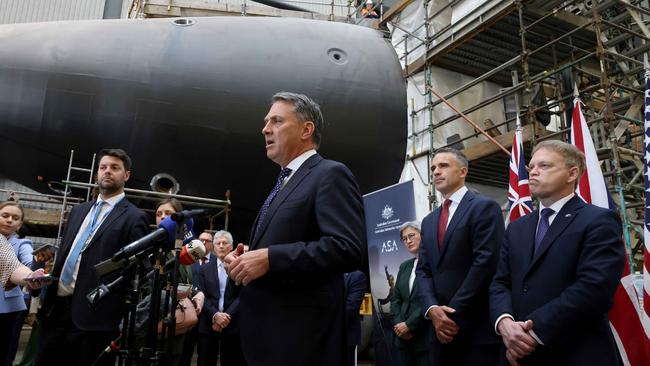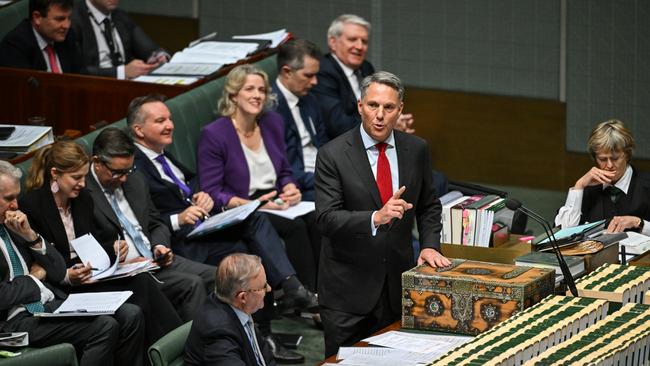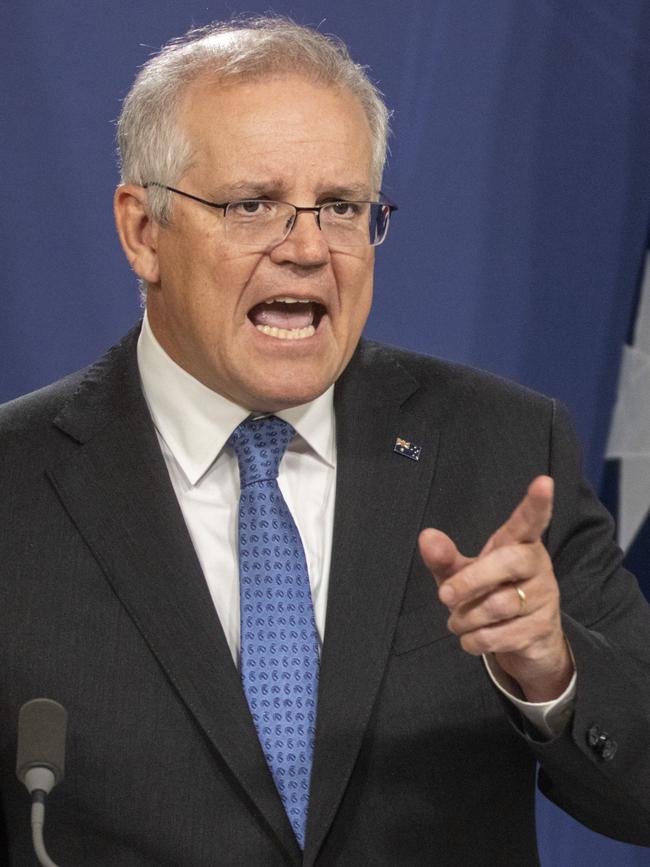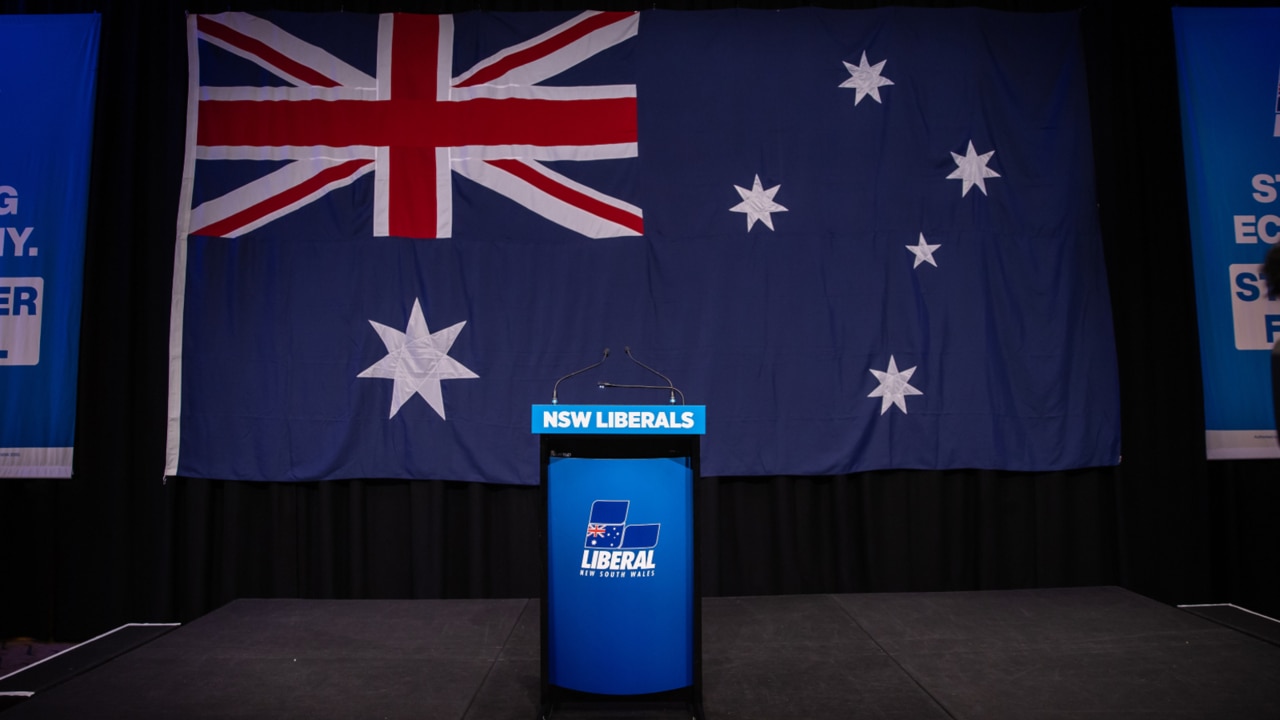
Nothing could better illustrate the intense irresponsibility of the Albanese government than this shockingly derelict defence budget. Anthony Albanese and Defence Minister Richard Marles have half convinced non-specialist commentators that they are doing great things in defence. This is the flat-out opposite of the truth. They are doing nothing at all. And are not even contemplating a noticeable increase in the defence budget until either the last budget of their notional second term, or the first budget of their even more notional third term.
This is not a conjecture or a tendentious claim or anything of the like. It’s the simple, undisputable facts. Yet by constantly claiming that utterly meaningless commitments to raise spending in 10 years’ time mean they are doing something now, the government has half succeeded in this absurd con.

The extent of that success was evident in Sunday’s ABC Insiders program. With three highly competent panellists, the first mention of defence nonetheless saw nodding agreement that the budget was increasing and would grow in due course to 2.5 per cent of gross domestic product.
Again, let’s be absolutely clear. There is not the slightest evidence of this in the budget papers, nor any indication that it may one day happen in the future. It would be the equivalent of me guaranteeing my football club, the NRL’s Canterbury Bulldogs, will win the premiership in 2047. I’m happy to make that a money-back guarantee. Take it up with me in 2048 if I’m wrong.
The truth is the defence budget this year is forecast to be 2.02 per cent of GDP. Next year, according to the budget papers, it will rise to the dizzy level of 2.04 per cent, but the following year fall back to 2.01 per cent. Only in the last year of the forward estimates, that’s four years into the future, is it predicted to rise to the dizzy level of 2.12 per cent.
But why on Earth would we trust even that prediction? In the year 2019-20, when defence had already reached 2 per cent of GDP, the budget forecast that this year we’d reach 2.21 per cent of GDP. But defence has come nowhere near that.
The whole business of defence spending is shrouded in obfuscation and deliberate opacity. But it’s worth sticking with this to try to understand the confidence trick the government is pulling here. Far from increasing defence spending, the Albanese government is following the funding line for defence first prepared in 2015 for the 2016 white paper. This was then updated in the 2020 Defence Strategic Update.

Both the Morrison and Albanese governments have basically followed those spending commitments in dollar terms. One reason the defence budget has not reached the percentage of GDP that it was scheduled to is because GDP has grown more quickly than forecast. So, you might say, if it’s a bigger pie, but Defence is still getting the dollars it was promised, that doesn’t matter. Big mistake. One reason the nominal GDP has grown so quickly is that inflation has been way above expectations.
So if GDP today is much bigger than it was forecast to be in 2019, but Defence is getting the same dollars it was forecast to get in 2019, that means its real purchasing power has declined. Marcus Hellyer, from Strategic Analysis Australia, is probably the most astute analyst of defence budgets we have. His calculation is that Defence has lost 8 per cent of its real budget through inflation over the last three years.
Defence is compensated for exchange rate movements. So if it’s going to buy US equipment that costs $100m, and our dollar falls by 10 per cent against the US dollar, Defence will get $110m, so it can buy the same equipment.
But it’s not compensated for inflation. So if a defence white paper or strategic update sets out a funding line over, say, the next eight years, and estimates inflation at the historic 2.5 per cent or so, Defence loses an enormous amount of purchasing power if inflation is unexpectedly high. Hellyer thinks Defence would need another $4bn a year to make up for what it’s lost in inflation in the last three years.
So the successive Morrison and Albanese governments have kept up the funding line as promised, but this has been ravaged by inflation. There is still a tiny real increase in the actual defence budget, even after inflation. Hellyer estimates that at about 1.6 per cent.
But the cost of defence equipment, plus the cost of defence personnel, is rising far more quickly than inflation. Therefore, even with this tiny increase, Defence can actually purchase less equipment than before.

The basic contradiction of the government’s position on defence spending is one I’ve pointed out before. The government says these are the worst strategic dangers we’ve faced since World War II. It has also embarked on what will eventually be the massive cost increase of switching from conventional to nuclear-powered submarines.
But to accommodate these pressing realities the government has made no significant increase in defence spending. Instead it’s cut existing and proposed capabilities. It’s massively reduced the army’s armoured vehicles.
I supported that decision so long as money went to other capabilities, but it hasn’t. The government’s own Defence Strategy says geography no longer protects Australia from long-range missiles. But what had been proposed as billions of dollars for ballistic missile defence has simply disappeared from all defence documents. We can presume it’s been scrapped.
We will no longer have a de-mining fleet. And the government has abolished plans to acquire a fourth fleet of F-35 Joint Strike Fighters. We’ve also decided not to put Tomahawk missiles on the Collins submarines. We’ve scrapped the idea of replenishment ships, but if we ever acquire a capable surface fleet we’ll need replenishment ships to allow it to operate at sea for longer.

Marles made a big deal of increasing defence spending over the forward estimates by $5.7bn. But it turns out the vast majority of this, fully $3.8bn, doesn’t arrive until year four of the forward estimates. That’s the first real increase in defence spending scheduled to occur under an Albanese government, in either the last budget of its second term or the first budget of its third term.
But if the Albanese government won’t increase defence spending today, when it has a budget surplus, the brand new shiny political object of AUKUS, a consensus that these are threatening strategic times, and all the presumed energy of a first-term government, what possible basis is there for thinking it will suddenly make really huge increases in defence in six years’ time, when the big money for AUKUS is scheduled to kick in.
You have to judge a government on what it does, and on defence the Albanese government is doing nothing. It couldn’t be more irresponsible.








Australia’s refusal to deal with reality was highlighted in the abysmal defence budget revealed as part of the wider national budget delivered by Treasurer Jim Chalmers last week.